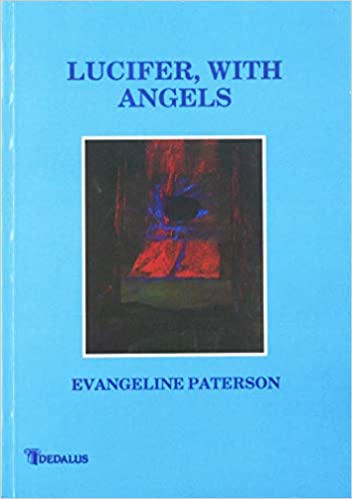
*****
Thanks to the kind permission of Evangeline Paterson’s literary executors, I’m delighted to have the opportunity to curate this taster of her poetry for The High Window, which is taken from Lucifer, With Angels (Dedalus Press, 1994), her Selected Poems. There’s a quote from Anne Stevenson on the back cover which still rings true today and provides an excellent introduction to her work:
There is an exhilarating wide-openness about Evangeline Paterson’s work. Free of mannerism and self-conscious effort, her poems flow naturally and unembarrassed from a lyrical source that is not untampered by wit. Evangeline Paterson keeps her balance without sacrificing her strength of feeling. Her poems are wise, very womanly, but they are never preachy. They are perfectly clear without lapsing into cliché or sentimentality. In a juster world, her books would sell in thousands; her popularity among those who still believe poetry can be a comprehensible and entertaining art is assured.
And if you’d like to learn more about Evangeline Paterson’s poetry, you can find my essay, titled ‘Marginalised and Pigeonholed’: a re-evaluation of Evangeline Paterson, at Wild Court.
You can also read an interview with Evangeline Paterson here
Matthew Stewart
Almendralejo, 2nd July, 2022.
*****
Matthew Stewart works in the Spanish wine trade and lives between Extremadura and West Sussex. His first full collection, The Knives of Villalejo, was published in 2017, and his second full collection is forthcoming from HappenStance Press in November 2023.
****
Evangeline Paterson: Six Poems from Lucifer with Angels

A WISH FOR MY CHILDREN
On this doorstep I stand
year after year
to watch you going
and think: May you not
skin your knees. May you
not catch your fingers
in car doors. May
your hearts not break.
May tide and weather
wait for your coming
and may you grow strong
to break
all webs of my weaving.
LEAVING FOR THE HOSPITAL
Too early for the gabble of geese, too early even
for the clatter of pails from the byre,
Mrs. Kavanagh stood by her kitchen table
in the circle of light from the fire
and looked at her familiar cups and saucers
as if she had never looked at them before.
The old man in the yard cranked the car
and called to her, and cranked the car again.
Then she looked round like somebody just waking,
and set her face, and went dumbly through the door.
She looked once at the house in the grey light,
and looked away, and did not look again,
but oh how her thoughts and fears and wishes clung
like straw to the hedges as she went down the lane.
INCIDENT IN THE HIGH STREET
Mrs Debrett and Miss Delaunay, pensioners
both, and lonely, happened to coincide
on the library steps, and spoke, though neither knew
the other’s name. Thawed by the autumn sun,
and the dahlias, shockingly red behind the railings,
they ventured out on an ice-thin, tentative
compatibility
xxxxxxxxxxtill they came to the crossing,
where Mrs Debrett, not thinking what she did,
offered an arm (who knows to what shade
of daughter, companion on shopping sprees,
or husband, always there till sadly missed)
and Miss Delaunay, goaded by fears that had driven her
all through her frozen life to her lonely bedsit,
looked the other way
and the traffic roared, like the sea of waste that washes
around the world, quenching so many flickering
candles and spent stars, and the teashop became
a harbour beyond their wavering strength to reach.
SONG IN MARCH
I could have left you
in winter, by your
fire’s red jewel, snow
fingering panes, snow
banked on roofs and hedges, wind
stilled, all restless water held in ice.
But now, when earth aches
with newly thrusting buds,
when sudden light comes shafting
through sullen cloud, when winds,
let loose, go ranging with
no mercy, when first lambs
cry weak and shrill on hillsides stung with hail
— how can I leave you now?
IMELDA’S MAM
That was the first time when it come to me
what a queer thing is death, when Imelda’s mam
was being let down carefully into the ground,
everyone holding their breaths, her kin standing
solid and black in the cold, like trees, when Imelda,
twelve years old and spoiled rotten, screamed,
sharp as a stone through glass.
xxxxxxxxxxxxxxxxxxxxxxxxxxxxxxxxxxxxI looked quick
at the coffin. I don’t know what I thought
I was going to see. Imelda’s mam was always
one to come running half the width of the world
if Imelda skinned her knee. But nothing ever
lay so dark and quiet as that deep hole
she’d gone down into.
xxxxxxxxxxxxxxxxxxxxxxxThat’s when it come to me
what a queer thing is death, what a mercy for some.
ROOM WITH SEA-COLOURED CURTAINS
Half-waking early
before dawn, we move
closer, we lie twined,
half-sleeping still.
Blue and purple and green
gleam in our deep-sea chamber.
The rocking of many tides
has brought us here. The dull
weight of the years to come
moves like the tide above us.
We lie, like two halves
of a whole, in one shell.
The light will break soon
on the fanged rocks. The sea-birds
will wake us.
But this moment we hold
against all comers.
Reblogged this on The Wombwell Rainbow.
LikeLike
I like them!
LikeLike
My Mum and Evangeline were friends for decades – largely by post or telephone, sharing poems, sharing lives, but visiting when she could. I have been searching for her poem ‘Harvest’ on the Troubles, and came here. I have no idea who the lady in the photo above these poems is. I’m sure she is lovely, but it is not Evangeline from Limavady, N.I, author of these poems. That Evangeline was a short lady of big heart, who loved to wear blues, purples and black and often, a scarf. Her grey hair pinned to loosely wreath her round, soft face, blue eyes bright at the supper table next to her husband, lips widely smiling.
LikeLike